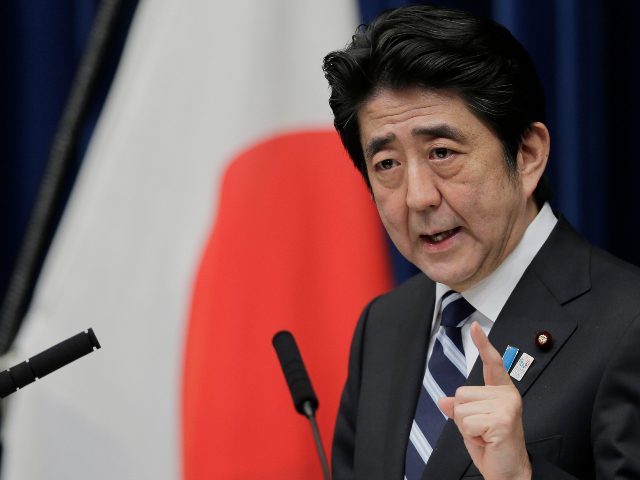China’s Global Times state propaganda outlet described former Japanese Prime Minister Abe Shinzo on Friday as having a “bad reputation” and a career littered with “wrongdoings” just hours after the Japanese government announced his death.
Police said a man identified as 41-year-old Yamagami Tetsuya fatally shot Abe during a campaign event on Friday morning in Nara, southern Japan, using what they have described at press time as an apparent homemade firearm. Abe was delivering a speech in support of legislative candidates on the ballot in regional elections to be held this weekend when Yamagami reportedly approached him from behind and attacked. Eyewitnesses say Abe continued to speak after the first shot, but fell over after being hit a second time and did not recover:
Abe was Japan’s longest-serving prime minister and stepped down in 2020 as a result of health issues. His conservative Liberal Democratic Party (LDP) continues to run the country; current Prime Minister Kishida Fumio was Abe’s foreign minister.
Abe’s tenure was marked by a firm foreign policy against communist and leftist threats, a warm embrace of the United States and President Donald Trump in particular, and a call for Japan to enhance its defense forces. Japan’s post-World War II Constitution bans it from having a formal military. Abe had long campaigned for an amendment to allow Japan to have more protection than its Self-Defense Forces (SDF).
Shortly before his death, Abe began to return to prominence, championing the cause of a free and peaceful Taiwan and urging the United States to cement a concrete relationship with Taiwan that would deter China from invading it.
The Communist Party of China initially reacted to the news of the attack on Abe by expressing “shock.” At the time of the Foreign Ministry’s daily press briefing, Japanese authorities had not yet confirmed Abe’s death.
“We are following the updates and hope that former Prime Minister Shinzo Abe will be out of danger and recover soon. We would like to extend sympathies to his family,” Foreign Ministry spokesman Zhao Lijian said at the time.
In a Japanese-language statement on Twitter – which Chinese citizens cannot legally use – Chinese government spokeswoman Hua Chunying later expressed condolences.
“I am surprised to hear that former Prime Minister Abe has passed away. We pray for his soul and condolences to his bereaved family for their contributions to the improvement and development of Sino-Japanese relations,” Hua wrote:
The Global Times, an official Chinese government outlet, adopted a different tone in addressing the development.
“Chinese observers described the assassination of Abe as the biggest political incident in Japanese politics since the end of World War II and warned about ripple effects from the death of this controversial figure,” the propaganda outlet asserted in its coverage, “who once contributed to China-Japan relations but later tore those achievements apart.”
The Global Times claimed that Abe had a “bad reputation among Chinese public [sic]” because he had visited and issued offerings to the Yasukuni Shrine, a monument to Japan’s war dead established in 1869. The shrine claims to honor nearly 2.5 million “divinities,” but the list includes several known war criminals from the Imperial era. Abe’s offerings to the shrine have thus outraged both the Chinese and Korean public, who endured heinous human rights atrocities at the hands of the Japanese during World War II.
Abe was far from the only public figure to outrage the Chinese government by visiting the shrine; Canadian celebrity Justin Bieber remains banned from China after unknowingly taking a photo at the shrine and posting it on social media.
The Global Times also took issue with Abe’s advocacy for Taiwan following the end of his prime ministership in 2020, claiming those “wrong words and deeds … almost completely overturned the achievements he once made in underpinning China-Japan ties.”
In a separate article, the state-run Global Times fretted that Abe would become a martyr for “right-wing forces.”
“The Japanese right-wing forces may use this incident to push forward the trend of conservative transformation in Japanese politics,” the Global Times predicted, “and Abe’s supporters will continue to promote ‘free and open Indo-Pacific’ and his other policies, bringing more security risks to the geopolitics of Northeast Asia, according to analysts.”
“Such violence should be strongly condemned, but Japan should reflect on whether there is a danger of polarization in its domestic politics,” a pro-communist “expert” opined in the article. The newspaper warned that “populist and other extreme ideas” could benefit from Abe’s loss.
“Abe’s death could stimulate the extreme Japanese right wing to promote populist, xenophobic and even extreme political goals, Lu Hao, a research fellow at the Institute of Japanese Studies at the Chinese Academy of Social Sciences, told the Global Times on Friday,” the newspaper claimed.
Abe’s assassination became a cause of celebration for many pro-communist Chinese on government-controlled social media outlets on Friday. The Great Translation Movement, a project meant to translate the most belligerent Chinese-language commentary on the Internet into English for Western knowledge, reproduced several joyous comments following confirmation of Abe’s death:
China’s government-censored Weibo social media outlet was among the most active celebratory outlets. Chinese state propagandists had eagerly disparaged Abe while he was alive. In April, Chen Weihua, a notoriously belligerent China Daily editor, referred to Abe as a “total assh*le and SOB”:
Prominent state propagandists have at press time opted against such insults, instead issuing condolences online:

COMMENTS
Please let us know if you're having issues with commenting.